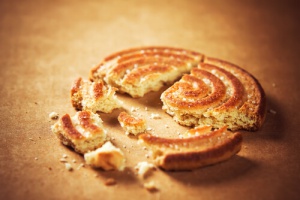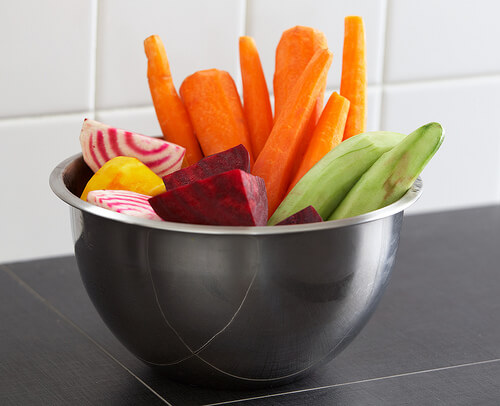The Best Foods to Eliminate Hunger without Weight Gain

Some people suffer because they feel like they need to continuously satiate their appetite, never feeling full or satisfied. So, in today’s article we’re going to point out the best foods to eliminate hunger without causing weight gain.
All of this could depend on age, metabolism, and the pace of life that each person leads. However, there are some foods that help make us feel fuller, without needing to consume them in large amounts.
It’s important to stress that a balanced diet is, in general, much more satiating than a diet rich in fats and sugars.
Foods to eliminate hunger: fruit and vegetables
Fruit and vegetables, especially when raw, are great foods to eliminate hunger and nourish the body with vitamins and minerals. They are also low in calories. The combination of fiber and water easily fills the stomach, and are the perfect solution to those moments when you feel the craving to munch on something.
A good option is to make fruit smoothies, by mixing a few pieces of fruit and blending them with water. You could also sweeten them with a bit of stevia if your fruits aren’t very sweet. Vegetable juices, on the other hand, aren’t as satisfying, because in most cases, they don’t have the fiber that fruit does.
Gazpacho is another healthy option, a cold soup made from vegetables (tomato, pepper, cucumber…) that needs to be drank without straining so as to retain the natural fiber in it.
Whole foods
Most flour and grains consumed today are refined, which means the fiber has been extracted from them. Eating them whole is much more satiating and also more beneficial for the body. Choose whole grain foods like rice, bread, and pastry flour, etc.
See also: Improve Liver Health: Whole-Gran Foods & Bitter Vegetables
Agar Agar
Agar agar is a seaweed that helps set foods because it acts as a gelatin. This seaweed is very satiating because it acts as a thickener in the stomach. Once it reaches the stomach and mixes with gastric juices, it increases in size and creates a sensation of fullness.
It is also very cleansing, helping to remove toxins and improve intestinal functions, and, as a result, preventing constipation.
It can be used in soups and stews, and it can also be used to make desserts, like gelatin, with fruit juice or vegetable beverages.

Legumes
Legumes, which in times gone by were consumed frequently, are currently a little forgotten. They are, however, excellent foods to eliminate hunger. They are rich in protein, which is why they could easily be the main dish for any meal, accompanied with a bit of vegetables and/or grains.
Unlike animal proteins, they are rich in fiber. In fact, if you were to eat them regularly, you would soon become regular.
If you tend to have poor digestion, cook them with a bit of cumin, curry, and fennel. Don’t mix this with any other foods. Alternatively, you can eat them in a puree.
An ancient remedy
You could also prepare a highly satiating meal by grinding and mixing equal parts of linseed, wheat germ and psyllium (a medicinal plant used as a natural laxative). Take one or two spoonfuls of the mix with a glass of water, 10 or 15 minutes before each meal. You’ll quickly notice how you no longer feel the need to eat so much.
Water
Thirst is often confused as hunger, and, on other occasions, you could also even be experiencing an “emotional hunger” – the need to put something into your mouth. For those times, there’s nothing better than drinking two glasses of water. In fact, every time you feel hungry, drink a glass of water. If you’re still hungry after five minutes, then eat something.
It is important that you drink warm water, and avoid drinking very cold water. This could cool the digestive system and make digesting foods more difficult.
Read more: 5 Surprising Benefits of Drinking Water
Chew food well
We mustn’t forget to talk about the importance of chewing your food well, which helps satiate the appetite. Hunger lasts for 20 minutes after you start eating. If you chew your food well, you won’t need to eat as much food, and it will also make it easier to digest what you have eaten.
Photos courtesy of Food Thinkers, hedonistin and sweetbeetandgreenbean.
All cited sources were thoroughly reviewed by our team to ensure their quality, reliability, currency, and validity. The bibliography of this article was considered reliable and of academic or scientific accuracy.
- American Heart Association News. (2019). Popcorn as a snack: healthy hit or dietary horror? https://www.heart.org/en/news/2019/06/18/popcorn-as-a-snack-healthy-hit-or-dietary-horror-show
- Flood, J. E., Rolls, B. J. (2007). Soup preloads in a variety of forms reduce meal energy intake. Appetite. 49 (3): 626 – 634. https://www.cochranelibrary.com/es/central/doi/10.1002/central/CN-00627376/full
- Godwin, N., Roberts, T., Hooshmand, S., Kern, M., & Young Hong, M. (2019). Mixed nuts may promote satiety while maintaining stable blood glucose and insulin in healthy, obese and overweight adults in a two-arm randomized controlled trial. Journal of Medicinal Food. 22 (4): 427-432. https://pubmed.ncbi.nlm.nih.gov/30897012/
- Keogh, J. B., Clifton, P. M. (2020). Energy intake and satiety responses of eggs for breakfast in overweight and obese adults. A crossover study. International Journal of Environmental Research and Public Health. 17 (15): 5583. https://www.mdpi.com/1660-4601/17/15/5583
- Marsset-Baglieri, A., Fromentin G., Nau, F., Airinei, G., Piedcoq, J., Rémond, D., Barbillon, P., Benamouzig, R., Tomé, D., & Gaudichon, C. (2015). The satiating effects of eggs or cottage cheese are similar in healthy subjects despite the differences in postprandial kinetics. Appetite. 90: 136-43. https://pubmed.ncbi.nlm.nih.gov/25772196/
- Nurshabani Salleh, S., Adli Hamizi Fairus, A., Nizam Zahary, M., Bhaskar Raj, N., & Maleyki Mhd Jalil, A. (2019). Unravelling the effects of soluble dietary fiber supplementation on energy intake and perceived satiety in healthy adults: evidence from systematic review and meta-analysis of randomised-controlled trials. Foods. 8 (1): 15. https://www.ncbi.nlm.nih.gov/pmc/articles/PMC6352252/
- Roe, L. S., Meengs, J. S., Rolls, B. J. (2012). Salad and satiety: the effect of timing of salad consumption on meal energy intake. Appetite. 58 (1): 242-248. https://www.ncbi.nlm.nih.gov/pmc/articles/PMC3264798/
- Stelmach-Mardas, M., Rodacki, T., Dobrowolska-Iwanek, J., Bzozowska, A., Walkowiak, J., Wojtanowska-Krosniak, A., Zagrodzki, P., Bechthold, A., Mardas, M., & Boeing, H. (2016). Link between food energy density and body weight changes in obese adults. Nutrients. 8 (4): 229. https://www.ncbi.nlm.nih.gov/pmc/articles/PMC4848697/
- Streed, J., (1 de abril de 2014). Perder peso: sentirse lleno con menos calorías. Mayo Clinic. https://newsnetwork.mayoclinic.org/es/2014/04/01/perder-peso-sentirse-lleno-con-menos-calorias/
- Tremblay, A., Doyon, C., & Sanchez, M. (2015). Impact of yogurt on appetite control, energy balance and body composition. Nutrition Reviews. 73 (Suppl 1): 23-7. https://pubmed.ncbi.nlm.nih.gov/26175486/
- Zhang, Z., Venn, B. J., Monro, J., & Mishra, S. (2018). Subjective satiety following meals incorporating rice, pasta and potato. Nutrients. 10 (11): 1739. https://www.ncbi.nlm.nih.gov/pmc/articles/PMC6267283/
This text is provided for informational purposes only and does not replace consultation with a professional. If in doubt, consult your specialist.









